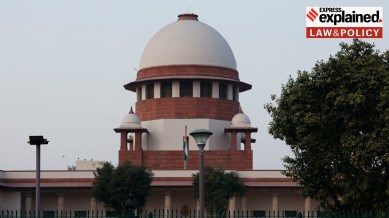When is a moveable asset ‘sizable’ enough to declare? It depends, says Supreme Court
Election candidates also have a right to privacy. They need not lay out their whole lives for voters to examine, the top court has ruled. But what if you have a watch? The SC has the answer.

The Supreme Court has said voters do not have an absolute right to know all details of a candidate’s private life, and candidates are not required to disclose every item of moveable property they own, unless its value amounts to a “sizable asset”.
Emphasising a candidate’s right to privacy in matters that are irrelevant to his candidature for public office or are of no concern to voters, the court allowed an appeal by Karikho Kri, whose election to the Arunachal Pradesh Assembly in 2019 was challenged on the ground that he had failed to disclose full information in his nomination papers.
What was the petition against Karikho Kri?
After Kri won the Tezu seat as an Independent, the Congress candidate, Nuney Tayang, filed a petition accusing him of suppressing material particulars in his election affidavit.
Tayang argued that Kri had not disclosed the ownership of vehicles, including his wife’s Maruti van and scooty, and his son’s motorcycle, and had not submitted a ‘no dues certificate’ for electricity and water charges of his government-provided accommodation.
Tayang asked the Itanagar Bench of the Assam, Nagaland, Mizoram, & Arunachal Pradesh HC to declare Kri’s election void under Sections 100(1)(b), 100(1)(d)(i), and 100(1)(d)(iv) of The Representation of the People Act, 1951, and to declare him elected instead.
Section 100(1) of the 1951 Act enumerates the grounds on which a candidate’s election can be invalidated.
Under Section 100(1)(b), an election can be declared void if “any corrupt practice has been committed by a returned candidate or his election agent or by any other person with the consent of a returned candidate or his election agent”.
Under Sections 100(1)(d)(i) and (iv), an HC can rule that election results have been “materially affected” if there is “improper acceptance” of a nomination or non-compliance of the provisions of the Constitution, the 1951 Act, or any Rules or orders made under the Act.
What did the High Court rule?
On July 7, 2023, the HC declared Kri’s 2019 victory void under Sections 100(1)(b), 100(1)(d)(i), and 100(1)(d)(iv) of the 1951 Act. However, it rejected Tayang’s prayer to declare him elected in place of Kri.
The HC ruled that non-disclosure of a vehicle registered in the name of a candidate or a dependent member of his family was sufficient to constitute the corrupt practice of “undue influence” under Section 123(2) of the RP Act, 1951.
So what are “corrupt practices” under the RPA?
Under Section 123, “corrupt practices” include bribery, undue influence, false information, and promotion or attempted promotion of “feelings of enmity or hatred between different classes of the citizens of India on grounds of religion, race, caste, community, or language” by a candidate for the furtherance of his prospects in the election.
Section 123(2) deals with “undue influence”: “any direct or indirect interference or attempt to interfere on the part of the candidate or his agent, or of any other person, with the consent of the candidate or his election agent, with the free exercise of any electoral right.” This could include threats of injury, social ostracism, and expulsion from any caste or community.
Convincing a candidate or elector that they will become “an object of divine displeasure or spiritual censure” too will be considered an interference “with the free exercise of the electoral right of such candidate or elector.”
And what did the Supreme Court say?
Upholding Kri’s appeal against the HC’s order, the top court said it was “not inclined to accept the blanket proposition that a candidate is required to lay his life out threadbare for examination by the electorate”. The candidate’s “right to privacy would still survive as regards matters which are of no concern to the voter or are irrelevant to his candidature for public office”, the court said.
In its 42-page order, the court noted that “it is not necessary that a candidate declare every item of movable property that he or his dependent family members owns, such as, clothing, shoes, crockery, stationery and furniture, etc., unless the same is of such value as to constitute a sizeable asset in itself or reflect upon his candidature, in terms of his lifestyle, and require to be disclosed”.
Every case must be “judged on its own facts”, the court said. “…There can be no hard and fast or straitjacketed rule as to when the non-disclosure of a particular movable asset by a candidate would amount to a defect of a substantial character,” it said.
Thus, if a candidate and his family own several high-priced watches aggregating to a large monetary value, they would constitute “high value” assets and reflect a “lavish lifestyle”, and suppressing such information would amount to “undue influence”.
“However, if a candidate and his family members each own a simple watch, which is not highly priced, suppression of the value of such watches may not amount to a defect at all,” the court said.